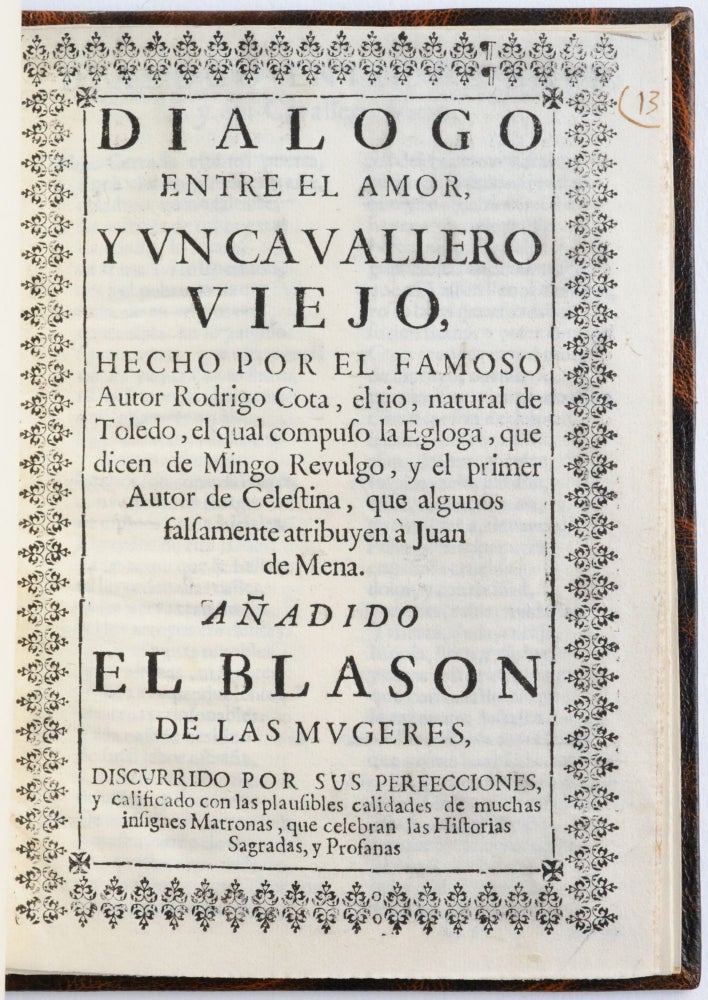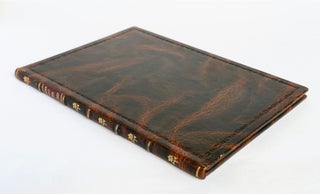Dialogo entre el Amor, y un Cavallero Viejo, hecho por el famoso Autor Rodrigo Cota, el tio, natural de Toledo, el qual compuso la Eloga, que dicen de Mingo Revulgo, y el primer Autor de Celestina, que algunos falsamente atribuyen à Juan de Mena. Anadido el Blason de las Mugeres, discurrido por sus perfecciones, y calificado con las plausibles calidades de muchas insignes Matronas, qua celebran las Historias Sagradas, y Profanas.
[Madrid]: [Se hallara à Imprenta de Don Pedro Joseph Alonso de Padilla, Impressor, y Mercader de Libros; vive en la Calle de Santo Thomàs, junto al Contraste], [around 1740]. In 20th century leather. Panels blind tooled, spine gilt with red title vignette. Marbled endpapers. 8º; (16) p. Numbered in ink on title page. Trimmed, the printed marginal note on A5 touched, but no effect on legibility. In fine condition.
Extremely scarce edition of this early Spanish dramatic poem by the fifteenth-century converso poet Rodrigo Cota.
Very less is known about Rodrigo Cota’s life, who was born between 1430 and 1440 into an important converso dynasty (Jewish converts into Christianity) of merchants and financiers in Toledo and died in 1505. Besides Dialogo, the present work, which was written around 1475, and published first anonymously in 1511 in the Cancionero general (by Hernando del Castillo; Valencia, Cristobal Koffman), Cota is the author of Epitalmio burlesco, a satire directed against “Judaizing” customs of a converso who marries a Christian. The authorship of Egloga que dicen de Mingo Revulgo and La Celestina, the earliest Spanish drama, was also attributed to him. (Gutwirth, 2013)
Dialogo entre el Amor, y un Cavallero Viejo is a poem in debate style between an old male lover and the god of love, considered as one of the finest Spanish poems of the fifteenth century and “a milestone in the history of the Spanish theatre because of the artistry of its plot, dialogue, emotions, contrast, and dramatic techniques”. (Chandler and Schwartz, 1991) Some literary historians (e.g. Gregory Kaplan) suggest an understanding of the text as an allegory to the general situation of the New Christians in Spain.
The present edition was published together with the scarce, early eighteenth-century romantic comedy, el Blason de las Mugeres by Pedro Joseph Alonso de Padilla, a printer in Madrid, who practiced his trade between 1733 and 1746.
Bibl.: Chandler, R. E., Schwartz, K.: A New History of Spanish Literature. Baton Rouge: Louisiana State University Press, 1993. p. 41.; Gutwirth, E.: Cota Rodrigo. In. Gerli, E. M. (ed.): Medieval Iberia. An Encyclopedia. London, New York: Routledge, 2013. pp. 268–269.; Kaplan, G.: Rodrigo Cota’s ‘Diálogo entre el Amor y un Viejo’: A ‘Converso Lament’. In: Indiana Journal of Hispanic Literatures. No. 8. Bloomington: Indiana University, Dept. of Spanish and Portuguese, 1996. pp. 7–30.
.
Price: €3,000.00


